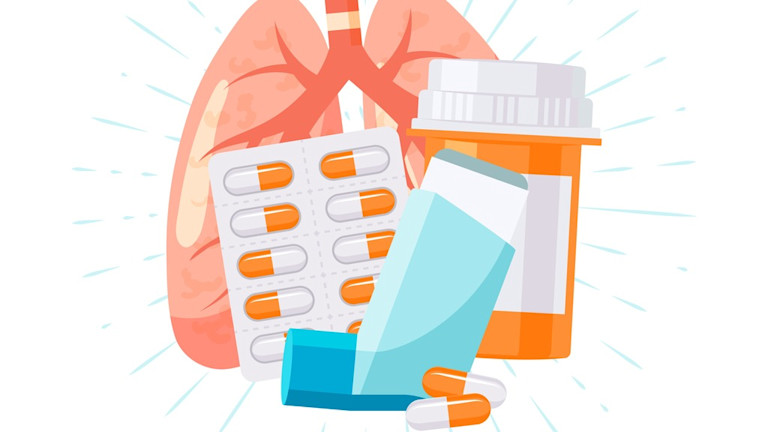What You Can Do to Help with COPD Treatment
Although COPD is not curable, it is treatable. Informed, aggressive, early treatment can change the course and slow progression of the disease.
Get insurance benefits, legal documents, and medical records in one place

Helpful Highlights
Help your loved one adhere to their prescribed COPD treatment plan.
Assist your loved one in avoiding common triggers.
Ensure your loved one has access to all necessary medications and knows how to take them as prescribed.
Consider additional therapies for moderate to severe COPD.
What can you do for your loved one?
In addition to the prescribed treatments in the next section, you can do a lot to help your loved one living with COPD thrive.
Help your loved one to stay on the prescribed COPD treatment plan.
Assist your loved one to avoid common triggers.
Smoking or being around others actively smoking
Indoor and outdoor air pollution - use an air ionizer, stay inside when outdoor air quality is low
Irritants such as aerosol sprays, as well as fumes from cooking or cleaning products
Keep indoor temperatures cool
Ensure everyone washes their hands frequently
Control household dust
Avoid anyone with active respiratory illness
Ensure your loved one has all the medications they need and knows how to take them as prescribed
Encourage early use of rescue medications (inhalers, nebulizers, anti-anxiety meds)
Encourage your loved one to get regular flu and pneumonia vaccines
Help your loved one to practice breathing exercises, relaxation, and body positioning techniques
Observe for subtle changes in demeanor or physical well-being and ask your loved one questions about what they're experiencing
Encourage your loved one to speak openly with you and their primary care provider (and, if referred, their pulmonologist)
Encourage your loved one to follow prescribed medications and treatments as ordered and monitor their adherence

COPD Medications
Some medications will be taken regularly and others as needed.
Bronchodilators. The first treatment used. They make breathing easier by relaxing and widening airways.
Inhaled steroids. These can reduce airway inflammation and help prevent exacerbations. They are useful for people with frequent exacerbations.
Combination inhalers. Some medications combine bronchodilators and inhaled steroids.
Oral steroids. Short courses of these (5-7 days) can prevent worsening COPD in the event of an exacerbation.
Phosphodiesterase-4 inhibitors. These decrease airway inflammation and relax the airways.
Theophylline. When other treatments have been ineffective or if cost is a factor, this is a less expensive medication that may improve breathing and prevent episodes of worsening COPD.
Antibiotics. Respiratory infections can aggravate COPD symptoms. Antibiotics are used to treat episodes of worsening COPD but aren't recommended for the prevention of exacerbations.

Additional therapies for moderate (Stage 3) or severe (Stage 4) COPD
Oxygen therapy
If there isn't enough oxygen in the blood, supplemental oxygen may be needed. Several devices deliver oxygen to the lungs, including lightweight, portable units (called concentrators) that your loved one can carry anywhere.
Some people with COPD use oxygen only during activities or while sleeping. Others use oxygen all the time. Oxygen therapy can improve quality of life and is the only COPD therapy proven to extend life.
Pulmonary rehabilitation program
These programs generally combine education, exercise training, nutrition advice, and counseling. A variety of specialists tailor the rehabilitation program to meet your loved one’s needs.
Pulmonary rehabilitation, especially following an exacerbation with hospitalization, may reduce readmission to the hospital, increase the ability to participate in everyday activities, and improve quality of life.
In-home noninvasive ventilation therapy
A bi-level positive airway pressure (BiPAP) device provides non-invasive ventilation therapy using a machine and mask. It helps to improve breathing and decrease the retention of carbon dioxide that may lead to acute respiratory distress and hospitalization.
Surgery
There are surgeries available for severe COPD, typically used in people who don't respond to medications. The surgeries do not cure COPD and they do not prolong life. They are intended to relieve symptoms (i.e., make breathing easier) and increase the quality of life remaining. These surgeries only help a small number of people.
Managing exacerbations
Even with ongoing treatment, symptoms may become worse for days or weeks. This is called an acute exacerbation, and it may lead to respiratory distress and lung failure if not treated promptly.
Exacerbations may be caused by a respiratory infection, air pollution, or other inflammatory triggers like smoking. Whatever the cause, it's important to seek prompt medical help if you notice a sustained increase in coughing or a change in mucus, or if your loved one has a harder time breathing.
When exacerbations occur, additional medications may be needed (such as antibiotics, steroids, or both), supplemental oxygen, or treatment in the hospital. Once symptoms improve, talk to the primary care provider or pulmonologist about measures to minimize or prevent future exacerbations.
RESOURCES
American College of Chest Physicians (ACCP) – COPD
American Lung Association (ALA) – COPD
American Thoracic Society (ATS) – COPD
COPD.com – Understanding COPD Stages & Progression
Global Allergy & Airways Patient Platform (GAAPP) – Four Stages of COPD
National Institutes of Health (NIH) Heart, Lung & Blood Institute – Lung Health Resources
No content in this app, regardless of date, should ever be used as a substitute for direct medical advice from your doctor or other qualified clinician.
Get more support and guidance on insurance benefits, medical records and legal forms.
Helpful brings together your insurance benefits, legal documents, and medical records in one personalized place — so you always know what you have, and never have to search again.

Technology for Health Tasks. Mental Health for the Tough Stuff.
Helpful connects your medical records, insurance, and caregiving tasks automatically. And when you need more than logistics, a therapist is here to guide you.
In-Network and Covered
For Individuals, Couples and Families
HIPAA Compliant, Data Stays Private


Healthcare Tasks Simplified

From syncing records to spotting drug interactions, Helpful does the heavy lifting, turning complex health info into clear tasks and showing you benefits you can actually use, giving you clarity and control over your care.

In-Network Mental Health

Our licensed therapists are here to support you and your loved ones through stress, burnout, and life’s hardest moments, with an inclusive, compassionate approach that works with most insurance plans.

Create Legal Documents

Plan ahead by creating will, trusts, advance directives and more, that ensure your wishes are honored in the event you can’t speak for yourself -with Helpful guiding you every step of the way.